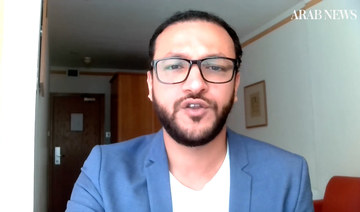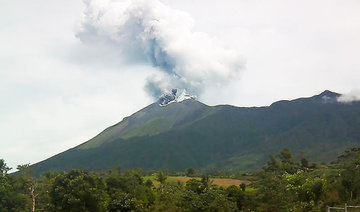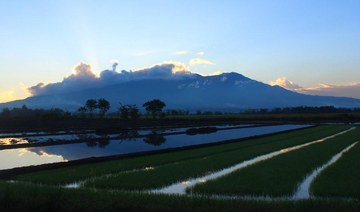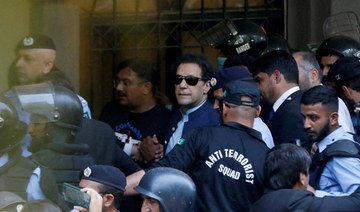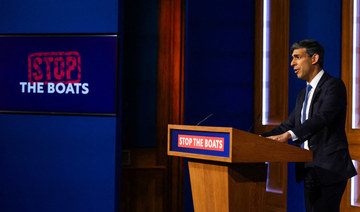DUBAI: Fiona Hill, who advised former UK prime minister Theresa May and served as the 10 Downing Street chief of staff, has launched the Future Resilience Forum, a security conference that aims to help transform the debate on diplomacy in a changing, increasingly multipolar world.
On the eve of the forum in London, she spoke about the “deep and meaningful partnership” between the UK and Saudi Arabia, particularly in the field of security; her fondness for the Kingdom as a tourism destination; and the ways in which Future Resilience Forum differs from the World Economic Forum and Munich Security Conference.
“The Future Resilience Forum is a platform for moving the dial on how we currently think and speak about foreign and security policy,” Hill told Katie Jensen, host of the Arab News current affairs show “Frankly Speaking.”
“This is really about saying to the world that we in Europe, we in the wider West, need to have a rethink about, or a reset about, how we collaborate, how we do diplomacy, how we set our foreign and security policies over the next 10 to 20 years.”
The inaugural event, on Oct. 10, will focus on how Western governments can forge a new relationship with the global south in the face of strategic competition, climate change, migration flows and emerging technologies.
According to the UN Conference on Trade and Development, the global south broadly comprises the developing economies of Africa, Latin America and the Caribbean, Asia (without Israel, Japan and South Korea), and Oceania (without Australia and New Zealand).
Hill advises Western governments to “start from scratch” in order ”to build security and foreign policy that can stand the test of time.”
She said: “We are looking predominantly at what’s happening in the global south, and we’re examining our approach to the global south in the West and asking the question, is it working? I think, probably, we can say no. And then being quite honest and asking ourselves why it doesn’t work, and listening to those people from those countries tell us what we are getting wrong.
“And that’s a good starting point for me to start working on the policy — that is how we get it right in the future, and how we reset those relationships, how we deepen them, how we make them meaningful, and how we take on competition from China and from Russia.”

On the eve of the forum in London, Fiona Hill spoke about the “deep and meaningful partnership” between the UK and Saudi Arabia. (AN Photo)
Explaining the added value of the Future Resilience Forum, Hill, a former journalist, said: “Very few of (the other major global) conferences have been set up by former chiefs of staff of a leading liberal Western democracy. I am coming at it with a very keen eye on outputs. I want it to almost be a red team event for policymaking in governments, a place where people can come and speak frankly, and privately.”
She added: “It’s essentially a private event for people to be able to discuss the short-term issues that they might be facing that are preventing them for thinking in the longer term. Because given the challenges that we face, it requires not just that collaborative working, but longer-term vision and longer-term thinking.”
Asked why the inaugural edition of the forum focuses on the theme of “resilience,” Hill said the changes and challenges the world faces today are unfamiliar, complex and multifaceted, requiring nations and institutions to be well prepared.
“We’re starting from a blank slate,” she said, “Everything has changed post 1945, post war, and we are now going through rapid changes, whether that’s in technology or whether that’s in our climate or whether it’s in geopolitical shifts.
“There’s a lot happening at the same time, and it’s all happening rather quickly. So, we need to really start preparing. And part of that preparedness is building resilience. If we don’t build resilience, then mistakes will be made.”
While addressing the UK’s strategic cooperation with the world, Hill’s former boss, Theresa May, who served as prime minister from 2016 to 2019, once said: “Our security is your security.”
This was well received by Saudi Arabia and the wider Gulf Cooperation Council area.
“I was with her when she delivered that speech,” said Hill. “For a very long time, the United Kingdom and the Kingdom of Saudi Arabia have worked completely together in a deep and meaningful partnership in counterterrorism and organized crime.
“Pretty much the whole security gambit. The UK has always looked to Saudi Arabia as one of its most serious partners in shaping what our security strategy is. And that’s really what she was saying.
“She was saying to the GCC, we cannot have a credible national security strategy if we don’t work in concert with you, because you are absolutely vital to what our security and our security response is.”
Grant Shapps, the UK’s newly appointed defense minister, recently lauded the rapid transformation of Saudi Arabia under Vision 2030, the social reform and economic diversification agenda launched by Crown Prince Mohammed bin Salman in 2016.
“Forget everything you think you know about Saudi Arabia,” said Shapps, indicating a further warming of ties between the two kingdoms.
“I’m a huge fan of Saudi Arabia,” said Hill. “I’ve visited many, many times in my life, and I have friends there. And I think it’s amazing the progress that has happened. And it’s a really vibrant and exciting place right now, and a great place to be and to visit as a tourist.”

Commenting on some of the changes Saudi Arabia has implemented in recent years, Hill said the pace of transformation was “amazing.” (AN Photo)
Commenting on some of the changes Saudi Arabia has implemented in recent years, Hill highlighted the decision to diversify into new sectors beyond hydrocarbons — a step that she believes will boost the Kingdom’s resilience in a turbulent world.
“The Kingdom of Saudi Arabia is still a relatively young country and so its government is rightly looking to diversify that reliance,” she said. “That seems to me to be very, very sensible. And keeping up with the modern world through technology and so forth, again, just very sensible.
“It’s amazing the pace at which the crown prince and his government have managed to do it. And I wish every amount of luck for further progress because, as Theresa said, ‘your security’s our security.’
“What’s interesting to me, in organizing the Future Resilience Forum, is how that’s actually becoming even more the case than before. As we see China’s dominance in the global south, we will look to countries like Saudi Arabia and Qatar almost as shock absorbers between East and West.
“That security relationship is far from becoming less relevant in the future. I see it as being almost absolutely critical in the future ... for security in the West.”
The UK government, led by Prime Minister Rishi Sunak, recently came in for criticism for appearing to water down its green pledges by extending the deadline on sale of new petrol vehicles beyond 2030 and clearing the way for oil extraction off the coast of Scotland.
Similar criticisms have been leveled at the UAE, a major oil producer, which will host the UN Climate Change Conference, COP28, in Dubai this November.
Although she recognizes the need to reduce emissions, Hill said the transition to clean and green renewables needs to be gradual, and that criticizing nations that produce and use oil and gas is not a pragmatic approach.
“Sadly, Scotland isn’t as big a producer as I think it ought to be. Being Scottish, I’m very, very proud of our oil and gas industry,” Hill said.
“I understand that the need to meet those climate challenges are very, very real. But I don’t think we should be throwing the baby out with the bath water too quickly because this transition will take time.
“And it won’t just take time in terms of how we get the right technology and how we get replacement energy. It’s also about how people will react to it and how people will absorb it into their new everyday ways of using energy and consuming energy. And that just won’t happen overnight.
“So, when people are critical of any country and its use of fossil fuels, I get it. People care about the planet. But I do think we have to be pragmatic about this. And pragmatism for me always wins the day. And that’s what I think the approach ought to be to the energy transition.”
Political life in the UK has been turbulent for several years. Leaving the EU has been wrenching for many, while years of austerity, followed by the pandemic and the war in Ukraine, have contributed to a cost-of-living crisis and the pressure on the health service.
Hill said she regards these ups and downs as part of a democratic system.

Fiona Hill advised former UK prime minister Theresa May (pictured) and served as the 10 Downing Street chief of staff. (Reuters/File Photo)
“We live in a democracy, and that means that we have election cycles,” she said. “And, of course, with election cycles, that does throw up various issues. That’s just the way democracy works. That’s the point of a democracy.
“I think that the current prime minister, Rishi Sunak — who is coming to the (Future Resilience Forum) conference for three hours of his time — understands that. He’s an extremely clever and able man, and the right person to have at the helm right now.”
She added: “At the end of the day, Rishi Sunak is a man who wakes up in the morning, looks at the challenges that his government faces and asks the right questions, and has a right mindset and a very good brain to be able to do his very best for his country. (And) he’s surrounded by an excellent team of advisers.”
As a former adviser to a UK prime minister, she says leaders should “try to resist short-term political rhetoric that can damage sometimes longer-term policy making.
“We will have an election in the not-too-distant future and the opposition (Labour) party under Sir Keir Starmer, these guys are serious also. They also understand the threats and the challenges and the complexity of all those challenges.”
Hill said that “running a country is difficult,” so any government will find the task “tough” given the “competing priorities.”
Currently, the Labour party is well ahead in the national polls, so could well unseat the ruling Conservatives in a general election next year. If Starmer does ride to victory, Hill says, the new prime minister must keep the UK’s future resilience in mind.
“What advice would I give Keir? Come to the Future Resilience Forum and find out what’s happening in terms of security and foreign policy, and where the debate is. And get ready for what will be a very difficult time to be a prime minister,” she said.
“These are not easy times. It really does test the mettle of a person who can take on a job like prime minister in the United Kingdom right now with the challenges that that prime minister will face.”





